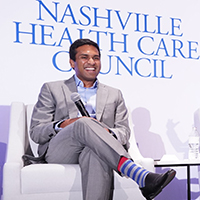The Nashville Health Care Council recently hosted the panel discussion “Measuring the Value in Health Care,” featuring three of the world’s top authorities on quality and measurement. More than 230 Council members attended the event at the Franklin Marriott Cool Springs to discern the meaning of value and how to measure it.
The panel included Leah Binder, president and CEO of The Leapfrog Group, a national nonprofit organization focused on the quality and safety of American health care; Marty Makary, M.D., surgeon and New York Times best-selling author who recently released, “The Price We Pay,” an analysis of the financial crisis in our health care system; and Shantanu Agrawal, M.D., president and CEO of the National Quality Forum, a nonprofit and nonpartisan group working to measure, standardize and improve the health care industry. The panel was moderated by Janet Marchibroda, senior vice president of health policy for government affairs firm Bockorny Group and a Bipartisan Policy Center fellow.
View event photos on Flickr.
Photo credit: (c) 2019, Donn Jones.
The panel quantified the need to improve patient care, defined value while addressing barriers to measurement, and discussed how health care communities can work together to make meaningful change.
Makary explained public distrust and a broad consensus around the need to address challenges in the U.S. health care system. “Health care billing and pricing are a ‘fog’ to people. We can have the cure, but if people don’t trust those in charge of their care, the cure is no good. Right now, about a quarter of the public has a distrust of the medical profession,” said Makary. “Inappropriate care, pricing failures and other areas can all be addressed.”
Panelists discussed key measures for value-based care focusing on patient-reported outcomes.
“My grandmother was in a retirement community which shared the same culture as most other retirement communities, don’t drive at night and eat early. When she was hospitalized for pneumonia, she found the quality of care to be good, which is something Leapfrog data verifies, but she decided to never recommend the hospital,” said, Binder. “Why? Because they served dinner at seven o’clock, hours later than seniors typically eat. The timing of meals is not a quality measure CMS will ever track, but it’s critical, because it’s important to patients. That’s how health care leaders need to think today.”
An audience member asked what will motivate hospital CEOs to prioritize consumer defined measures of care, like mealtimes. Binder replied, “Losing market share,” and noted that it’s becoming more common for patients to choose a new health care setting based on priorities that extend beyond medical care.
Marchibroda emphasized the need to balance the benefits of individual measures of data with the challenges of data collection. She additionally noted a perceived burden of measurement among some in the health care industry.
“Measurement should not be a burden,” Agrawal responded. Reminding the audience not to lose sight of the central issues measurement addresses – quality improvement and transparency. “IT solutions should be used to remove the manual effort which can make measurement difficult. And, it’s our responsibility to make sure measures are ‘good’ and those are measures that are scientifically sound, have consensus around them, and are useful. We remove measures that are either no longer relevant to delivery programs or have been replaced with better measures.”
Marchibroda also challenged the panel to anticipate the future, asking how the measurement of health care value will continue to evolve. The panelists agreed transparency will continue to be one of the most important issues around health care value. Agrawal noted the need for industry-wide dedication to quality, rather than competition among providers. Binder and Makary added that younger generations will play an important role in the future of health care value through the consumer-driven health care movement.

About the Nashville Health Care Council
The Nashville Health Care Council is a premier association of health care industry leaders working together to inspire global collaboration to improve health care by serving as a catalyst for leadership and innovation. Since 1995, the Council has served as a trusted source for information on trends and innovations influencing the nation’s health care industry. Through regular programs, the Council provides members with unparalleled access to national and international policymakers, industry innovators, and thought leaders.
Home to 17 publicly traded health care companies, Nashville’s health care industry generates more than $92 billion in annual revenues and 570,000 jobs globally. It is Middle Tennessee’s largest and fastest-growing employer. For more information on the Council, please visit www.healthcarecouncil.com.
